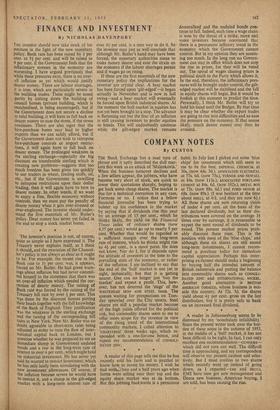COMPANY NOTES
By CUSTOS THE Stock Exchange has a neat turn of phrase and it aptly described the dull mar- kets this week as an attack of `Malenkovia.' When the business turnover declines and a few sellers appear, the jobbers, who have become very short of stock, are quick to lower their quotations sharply, hoping to get back some cheap shares. The market is due for a technical correction in any case, Formosa or no. I notice that a fellow financial journalist has been trying to bolster up his confidence in the market by saying that if dividends rise this year by an average of 15 per cent., which he thinks likely, the yield on the Financial Times index of ordinary shares (now 4.35 per cent.) would go up to nearly 5 per cent. Whether that would be regarded as a sufficient margin over the long-term rate of interest, which he thinks might rise to 4+ per cent, is a moot point. He does not know. Nor do I, for it depends upon the attitude of investors at the time to the prevailing state of the economy, or rather of the inflation. 1 am inclined to say that the end of the 'bull' market is not yet in sight, technically, but that it is 'getting nearer. One can no longer just `buy the market' and expect a profit. This, how- ever, has not deterred the `stags' of the WHITEHEAD IRON AND STEEL issue. The queues waiting for prospectuses on Tues- day sprawled over the City streets. Steel shares are still a popular market because of the high yields offered for the political risk, but commodity shares seem to me to offer more scope for the investor in view of the rising trend of the international commodity markets, I called attention to `CHARTERED' three weeks ago, which re- sponded with a one-for-one bonus, and repeat my recommendation of CONSOLI-
DATED ZINC. • • •
A reader of this page tells me that he has recently sold his farm and is puzzled to know how to invest his money. I wish he had writtk...i two and a half years ago when farms were selling near their top and the equity share market was at its bottom. But this jobbing backwards is a pernicious
36s. (now 44s. 3d.), ASSOCIATED ELECTRICAL at 57s. 6d. (now 73s.), TURNER AND NEWALL at 84s. (now 113s.), ASSOCIATED PORTLAND CEMENT at 84s. 6d. (now 102s.), METAL Box at 73s. (now 88s. 6d.) and FORD MOTOR at
68s. (now 89s.). (I was hesitant at the time
about SHELL at and they are now 6k.) All these shares are now returning yields of under 4 per cent. on the basis of the last declared dividends, but as their dis- tributions were covered on the average 3# times over by earnings, it is reasonable to expect the next round of dividends to be raised. The present market prices prob- ably discount these rises. This is the position with most of the `blue chips,' and although these six shares are still sound long-term investments, I cannot recom- mend a purchase today for immediate capital appreciation. Perhaps this enter- prising ex-farmer should make a beginning by buying half the intended amount of British industrials and putting the balance into commodity shares such as CONSOLI- DATED ZINC and INTERNATIONAL NICKEL. Another good alternative is BRITISH AMERICAN TOBACCO, whose business is out- side this country. At 52s. 3d. the shares yield about 4* per cent. gross on the last distribution, but it is pretty safe to bank on an increased final dividend.


































 Previous page
Previous page